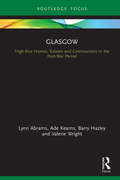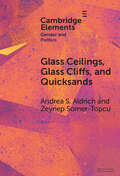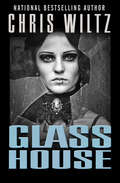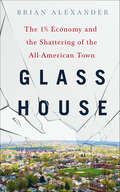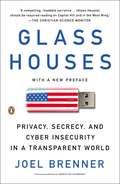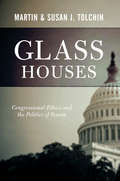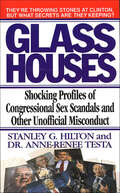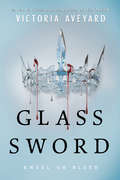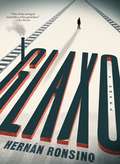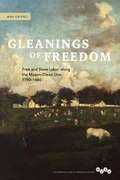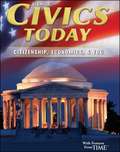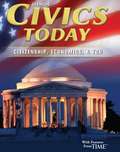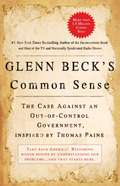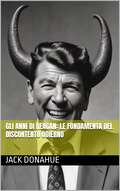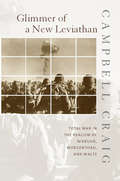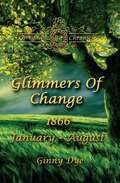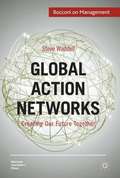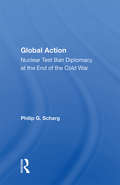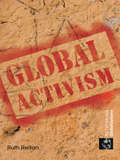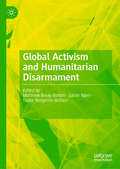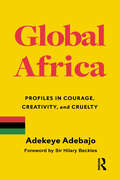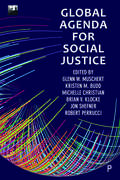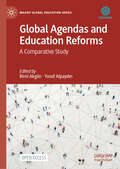- Table View
- List View
Glasgow: High-Rise Homes, Estates and Communities in the Post-War Period (Built Environment City Studies)
by Lynn Abrams Barry Hazley Ade Kearns Valerie WrightIn the wake of an unparalleled housing crisis at the end of the Second World War, Glasgow Corporation rehoused the tens of thousands of private tenants who were living in overcrowded and unsanitary conditions in unimproved Victorian slums. Adopting the designs, the materials and the technologies of modernity they built into the sky, developing high-rise estates on vacant sites within the city and on its periphery. This book uniquely focuses on the people's experience of this modern approach to housing, drawing on oral histories and archival materials to reflect on the long-term narrative and significance of high-rise homes in the cityscape. It positions them as places of identity formation, intimacy and well-being. With discussions on interior design and consumption, gender roles, children, the elderly, privacy, isolation, social networks and nuisance, Glasgow examines the connections between architectural design, planning decisions and housing experience to offer some timely and prescient observations on the success and failure of this very modern housing solution at a moment when high flats are simultaneously denigrated in the social housing sector while being built afresh in the private sector. Glasgow is aimed at an academic readership, including postgraduate students, scholars and researchers. It will be of interest to social, cultural and urban historians particularly interested in the United Kingdom.
Glass Ceilings, Glass Cliffs, and Quicksands: Gendered Party Leadership in Parliamentary Systems (Elements in Gender and Politics)
by Andrea S. Aldrich Zeynep Somer-TopcuUsing novel leadership data from eleven developed parliamentary democracies between 1980 and 2020, this Element asks how gender conditions party leaders' candidacy, selection, and survival. It examines the life cycle of party leadership careers of 276 leaders with a focus on three categories of variables: performance indicators, (s)election details, and inclusiveness of political culture. It tests the existing theories of glass ceilings and glass cliffs on how certain conditions make it more likely that women run for and are selected as party leaders. The Element also offers an original quicksand theory on leaders' survival in office that, for women, leadership is akin to being caught in quicksand. Several factors agitate the quicksand and make them sink faster. The authors data shows support for the glass ceiling and quicksand theories. Yet, they find mixed support for the glass-cliff theory. The Element offers unique insights into women's experience with party leadership.
Glass House: A Novel (Voices Of The South Ser.)
by Chris WiltzFrom the national-bestselling author: A &“powerful, heartbreaking&” tale of racial tensions and tragic violence in New Orleans—based on true events (Publishers Weekly). Thea Tamborella returns to New Orleans after a ten-year absence to find the city of her birth changed, still a place of deep contradictions, a sensuous blend of religion, tradition, bonhomie, and decadence, but now caught in a web of fear caused by bad economic times, crime, and racial unrest. Burgess Monroe is the drug kingpin of the Convent Street Housing Project. He has always known he would die young, and now he wants to use his wealth to do something for the poor people of the project where he grew up. Delzora Monroe, Burgess&’s mother, works as a housekeeper in the mansion on Convent Street that Thea inherits from her aunt. Zora loves her son, but she knows that he has used his life to do evil, and she mistrusts his motives. She fears the repercussions when an attraction develops between Thea and Burgess. The violence that results from the death of the lone cop has the city in the grips of fear. On both sides of Convent Street, the rich and the poor, that violence is about to be played out . . .
Glass House: The 1% Economy and the Shattering of the All-American Town
by Brian AlexanderFor readers of Hillbilly Elegy and Strangers in Their Own LandWINNER OF THE OHIOANA BOOK AWARDS AND FINALIST FOR THE 87TH CALIFORNIA BOOK AWARDS |NAMED A BEST/MOST ANTICIPATED BOOK OF 2017 BY: New York Post • Newsweek • The Week • Bustle • Books by the Banks Book Festival • Bookauthority.comThe Wall Street Journal: "A devastating portrait...For anyone wondering why swing-state America voted against the establishment in 2016, Mr. Alexander supplies plenty of answers." Laura Miller, Slate: "This book hunts bigger game.Reads like an odd?and oddly satisfying?fusion of George Packer’s The Unwinding and one of Michael Lewis’ real-life financial thrillers."The New Yorker : "Does a remarkable job." Beth Macy, author of Factory Man: "This book should be required reading for people trying to understand Trumpism, inequality, and the sad state of a needlessly wrecked rural America. I wish I had written it." In 1947, Forbes magazine declared Lancaster, Ohio the epitome of the all-American town. Today it is damaged, discouraged, and fighting for its future. In Glass House, journalist Brian Alexander uses the story of one town to show how seeds sown 35 years ago have sprouted to give us Trumpism, inequality, and an eroding national cohesion.The Anchor Hocking Glass Company, once the world’s largest maker of glass tableware, was the base on which Lancaster’s society was built. As Glass House unfolds, bankruptcy looms. With access to the company and its leaders, and Lancaster’s citizens, Alexander shows how financial engineering took hold in the 1980s, accelerated in the 21st Century, and wrecked the company. We follow CEO Sam Solomon, an African-American leading the nearly all-white town’s biggest private employer, as he tries to rescue the company from the New York private equity firm that hired him. Meanwhile, Alexander goes behind the scenes, entwined with the lives of residents as they wrestle with heroin, politics, high-interest lenders, low wage jobs, technology, and the new demands of American life: people like Brian Gossett, the fourth generation to work at Anchor Hocking; Joe Piccolo, first-time director of the annual music festival who discovers the town relies on him, and it, for salvation; Jason Roach, who police believed may have been Lancaster’s biggest drug dealer; and Eric Brown, a local football hero-turned-cop who comes to realize that he can never arrest Lancaster’s real problems.
Glass Houses
by Joel BrennerA chilling and revelatory appraisal of the new faces of espionage and warfare on the digital battleground Shortly after 9/11, Joel Brenner entered the inner sanctum of American espionage, first as the inspector general of the National Security Agency, then as the head of counterintelligence for the director of National Intelligence. He saw at close range the battleground on which adversaries are attacking us: cyberspace. Like the rest of us, governments and corporations inhabit "glass houses,” all but transparent to a new generation of spies who operate remotely from such places as China, the Middle East, Russia, and even France. In this urgent wake-up call, Brenner draws on his extraordinary background to show what we can-and cannot-do to prevent cyber spies and hackers from compromising our security and stealing our latest technology. .
Glass Houses: Congressional Ethics And The Politics Of Venom
by Marty TolchinThe Congressional ethics process has been transformed into a lethal, partisan political tool, feared by lawmakers from both sides of the aisle. . Newt Gingrich, the Ghengis Khan of recent American politics, wrenched the humdrum Congressional ethics process out of its lethargy and turned it into an offensive tool for partisan gain. Now, instead of yawning, lawmakers quake at the thought of an ethics inquiry that can easily, often unfairly, tip elections and ruin careers. While members of the House and Senate confront the public's changing attitudes toward money, sex, and power, they are also forced to raise ever-escalating sums to finance their campaigns. Practices tolerated a decade ago now may cost lawmakers their seats or land them in jail. Lawmakers often don't know if they live in Salem or Gomorrah. Using new information culled from dozens of Capitol Hill interviews, Sue and Marty Tolchin show how ethics in Washington have changed over two centuries while offering new interpretations of past ethics cases. The first book to analyse the politicization of the ethics process, Glass Houses reveals in wicked and telling detail the forces that drive the modern lawmaker into a maelstrom of fierce corruption battles.
Glass Houses: Shocking Profiles of Congressional Sex Scandals and Other Unofficial Misconduct
by Stanley G. Hilton Anne-Renee TestaThe infamous Starr Report, which made Bill Clinton's private life very public, had one specific aim: to send the 42nd U.S. President packing. But many of those who will sit in judgment of Clinton have plenty of skeletons in their own closets--now revealed by Stanley G. Hilton and Dr. Anne-Renee Testa in Glass Houses: Shocking Profiles of Congressional Sex Scandals and Other Unofficial Misconduct. From sex scandals to financial fraud to political misconduct, discover what scores of members of the U.S. House and Senate--Republicans and Democrats alike--are hiding beneath self-righteous veneers. And learn, from a renowned psychologist, what drives politicians in particular to commit such risky acts.
Glass Sword (Red Queen #2)
by Victoria AveyardThe electrifying next installment in the Red Queen series escalates the struggle between the growing rebel army and the blood-segregated world they've always known--and pits Mare against the darkness that has grown in her soul.Mare Barrow's blood is red--the color of common folk--but her Silver ability, the power to control lightning, has turned her into a weapon that the royal court tries to control. The crown calls her an impossibility, a fake, but as she makes her escape from Maven, the prince--the friend--who betrayed her, Mare uncovers something startling: she is not the only one of her kind.Pursued by Maven, now a vindictive king, Mare sets out to find and recruit other Red-and-Silver fighters to join in the struggle against her oppressors. But Mare finds herself on a deadly path, at risk of becoming exactly the kind of monster she is trying to defeat.Will she shatter under the weight of the lives that are the cost of rebellion? Or have treachery and betrayal hardened her forever? the darkness that has grown in her soul.
Glaxo
by Samuel Rutter Hernan RonsinoGlaxo is a chilling novel of betrayal, romance, and murder, from a major Latin American writer being published in English for the first time.In a derelict town in Argentina's pampa, a decades-old betrayal simmers among a group of friends. One returns from serving time for a crime he didn't commit; another, a policeman with ties to the military regime, discovers his wife's infidelity; a third lays dying. And an American missionary has been killed. But what happened among these men? Spinning through a series of voices and timelines, Glaxo reveals a chilling story of four boys who grow up breaking horses and idolizing John Wayne, only to become adults embroiled in illicit romances, government death squads, and, ultimately, murder. Around them, the city falls apart. Both an austere drama and a suspenseful whodunit, Glaxo crackles with tension and mystery. And it marks the stunning English-language debut of a major Latin American writer.
Gleanings of Freedom: Free and Slave Labor along the Mason-Dixon Line, 1790-1860
by Max GrivnoLate eighteenth- and early nineteenth-century landowners in the hinterlands of Baltimore, Maryland, cobbled together workforces from a diverse labor population of black and white apprentices, indentured servants, slaves, and hired workers. This book examines the intertwined lives of the poor whites, slaves, and free blacks who lived and worked in this wheat-producing region along the Mason-Dixon Line. Drawing from court records, the diaries, letters, and ledgers of farmers and small planters, and other archival sources, Max Grivno reconstructs how these poorest of southerners eked out their livings and struggled to maintain their families and their freedom in the often unforgiving rural economy.
Gleichwertige Lebensverhältnisse in Deutschland?: Lokale Sichtweisen auf ein erklärtes Ziel deutscher Politik
by Astrid Lorenz Luisa PischtschanGleichwertige Lebensverhältnisse zu gewährleisten, ist in Deutschland ein rechtlich verankertes Ziel. Dieses Open-Access-Buch analysiert, welche Aspekte Menschen wichtig sind, wenn es um ein gutes Leben geht, mit welchen Orten oder Regionen sie ihre Lebensverhältnisse vergleichen und was ihnen politisch sinnvoll erscheint, um etwas für gleichwertige Lebensverhältnisse zu tun. Zugleich erkundet es, ob diese Sichtweisen Potenzial für räumliche Konflikte und damit Sprengstoff für den gesellschaftlichen Zusammenhalt bergen und ob sie von den Themen abweichen, die in der Politik als Kennzeichen für „gleichwertige Lebensverhältnisse“ betrachtet werden. Dafür wurden 913 Seiten Datenmaterial aus Gruppendiskussionen in 24 deutschen Kommunen, 915 Seiten ergänzende schriftliche Befragungen sowie 203 Seiten Transkripte von einordnenden Interviews mit kommunalen Spitzenverbänden ausgewertet. Darüber hinaus informiert das Buch über die Politik und Zuständigkeiten für gleichwertige Lebensverhältnisse und den Forschungsstand zum Thema. Es richtet sich an Interessierte aus der Wissenschaft, Medien, Politik, Verwaltung und Zivilgesellschaft.
Glencoe Civics Today: Citizenship, Economics, & You
by John J. Patrick Richard C. Remy Gary E. Clayton David C. SaffelCivics Today: Citizenship, Economics, and Youmeets the content standards for civics and government as outlined by the National Standards for Civics and Government.Many young citizens are completing their education with little or no sense of civic responsibility.Civics Today: Citizenship, Economics, and Youteaches the knowledge and skills needed to be an effective, active citizen. It also encourages an appreciation for the American political system. It will foster a willingness to take part in American democracy.Two economics units provide an understanding of the interrelationship between democracy and the free enterprise system. .
Glencoe Civics Today: Citizenship, Economics, & You
by John J. Patrick Richard C. Remy Gary E. Clayton David C. SaffellA civics program building the next generation of active Americans Civics Today: Citizenship, Economics, and Youmeets the content standards for civics and government as outlined by the National Standards for Civics and Government. Many young citizens are completing their education with little or no sense of civic responsibility. This program teaches the knowledge and skills needed to be an effective, active citizen. It also encourages an appreciation for the American political system and fosters a willingness to take part in American democracy. Two economics units provide an understanding of the interrelationship between democracy and the free enterprise system.
Glenn Beck's Common Sense
by Glenn Beck"If you believe it's time to put principles above parties, character above campaign promises, and Common Sense above all -- then I ask you to read this book...." In any era, great Americans inspire us to reach our full potential. They know with conviction what they believe within themselves. They understand that all actions have consequences. And they find commonsense solutions to the nation's problems. One such American, Thomas Paine, was an ordinary man who changed the course of history by penning Common Sense, the concise 1776 masterpiece in which, through extraordinarily straightforward and indisputable arguments, he encouraged his fellow citizens to take control of America's future -- and, ultimately, her freedom. Nearly two and a half centuries later, those very freedoms once again hang in the balance. And now, Glenn Beck revisits Paine's powerful treatise with one purpose: to galvanize Americans to see past government's easy solutions, two-part monopoly, and illogical methods and take back our great country.
Gli anni di Reagan: Le Fondamenta del Discontento Odierno
by Jack DonahueGli anni di Reagan: Le Fondamenta del Discontento Odierno è un'esaminazione completa e impeccabile delle politiche e dell'influenza non solo di uno dei peggiori presidenti degli Stati Uniti, ma anche di una delle peggiori persone nella storia americana, Ronald Reagan. Il libro esamina criticamente gli effetti a lungo termine della presidenza di Reagan, mettendo in discussione la narrativa dominante e facendo luce su come il suo mandato sia stato non solo imperfetto, ma abbia anche condotto a delle decisioni che hanno generato molte delle crisi che ci ritroviamo ad affrontare oggi. Esaminando le "Reaganomics" e il ruolo che queste hanno avuto nell’allargamento dell'ineguaglianza di reddito, e la guerra alla droga con la conseguente incarcerazione di massa, questo libro analizza attentamente i diversi modi in cui le scelte politiche di Reagan hanno plasmato negativamente l'America moderna. Evidenzia gli effetti dello smantellamento, da parte di Reagan, della rete di sicurezza sociale, il suo fallimento nel rispondere adeguatamente all'epidemia di AIDS, e il suo miope approccio alla politica ambientale, evidenziando gli estesi e dannosi impatti che tutte queste decisioni hanno avuto. Gli anni di Reagan: Le Fondamenta del Discontento Odierno è una critica provocatoria e approfondita di una presidenza che è stata spesso protetta da un alone di nostalgia e carisma. Questo libro offre una prospettiva alternativa che identifica Reagan come un importante catalizzatore delle attuali problematiche sociali e politiche. Si tratta di una lettura imprescindibile per chiunque sia interessato a comprendere le radici del discontento odierno in America.
Glimmer of a New Leviathan: Total War in the Realism of Niebuhr, Morgenthau, and Waltz
by Campbell CraigThe Second World War put an end to America's historical isolationism. Three American thinkers--Reinhold Niebuhr, Hans Morgenthau, and Kenneth Waltz--developed a modern strategic framework that sought to introduce Americans to the harsher realities of international politics. Yet even as the United States began to embrace this new Realism, atomic weaponry threatened to make it absurd. This engrossing story of how the three chief architects of a powerful ideology struggled with the implications of their own creation offers crucial context for contemporary debates about the resort to war and weapons of mass destruction.
Glimmer of a New Leviathan: Total War in the Realism of Niebuhr, Morgenthau, and Waltz
by Campbell CraigThe Second World War put an end to America's historical isolation from international power politics, and so also to the long-standing American defiance of the Realist ideology that shaped Old World affairs. The advent of transoceanic military technologies, now wielded by menacing states such as Nazi Germany and the Soviet Union, made Americans more receptive to the Realist idea that international relations is about fear and survival. The American Realists Reinhold Niebuhr, Hans Morgenthau, and Kenneth Waltz developed a modern strategic framework that sought to introduce American leaders and the educated public to these harsher realities of international politics. They emphasized a clear-eyed, cold approach to the play of interests, egotism, and the drive for power in world affairs—a struggle in which the threat of major war remained, in the end, the only legitimate currency. Yet even as Americans began to accept this new Realism, thermonuclear weaponry threatened to make it absurd. A major war to defend the nation might result in its total destruction; a thermonuclear war leading to the death of hundreds of millions of citizens seemed an unusual way to preserve American survival. This dilemma became central to the Realist understanding of Niebuhr, Morgenthau, and Waltz. How could a Realist approach to international politics and war be sustained in the face of possible global annihilation? Glimmer of a New Leviathan is the engrossing story of how the three chief architects of an influential ideology struggled with the implications of their own creation. It offers crucial historical context for contemporary debates about weapons of mass destruction and the post-Cold War international order.
Glimmers of Change (The Bregdan Chronicles Ser. #7)
by Ginny DyeGlimmers of Change continues the sweeping historical saga that encompasses the first full year of the American Reconstruction. However, has the Civil War really ended? As far as the characters are concerned, Carrie and Janie are living their dream in Philadelphia, but what price will they pay when cholera sweeps through America once again? Robert searches for peace on the plantation, but forces are in place that are determined to deny it. Moses and Rose are driven by forces beyond their control to become leaders in the midst of a violent racial revolution. Jeremy discovers love, but will the reality of his heritage make it impossible, and will he survive the forces determined to destroy the factory? Finally, will Matthew free his heart and find love?
Global Action Networks
by Steve WaddellThe world's governments are overwhelmed with climate change, war and unrest, the global financial crisis and poverty but there is a promising invention in Global Action Networks (GANs). GANs mobilize resources, bridge divides and promote the long-term deep change and innovation work that is needed to address the global challenges.
Global Action: Nuclear Test Ban Diplomacy At The End Of The Cold War
by Philip G. SchragThis book explores the strategies of the global movement to change American nuclear test ban policy at the End of the Cold War, and the sources and nature of the George Bush administration's resistance to change.
Global Activism (Rethinking Globalizations Ser. #5)
by Ruth ReitanThis comprehensive study traces the transnationalization of activist networks, analyzing their changing compositions and characters and examining the roles played by the World Social Forum in this process. Comparing four of the largest global networks targeting the 'neoliberal triumvirate' of the World Bank, the IMF and the World Trade Organization: the Jubilee anti-debt campaigners Via Campesina peasant farmers Our World Is Not For Sale and the anarchistic Peoples’ Global Action. Written by a scholar-activist, the book highlights that despite their diversity, these collective actors follow a similar globalizing path and that networks in which solidarity is based on a shared identity perceived as threatened by neoliberal change are gaining strength. Social forums are depicted as a fertile ground to strengthen networks and a common ground for cooperative action among them, but also a battleground over the future of the forum process, the global anti-neoliberal struggle, and 'other possible worlds' in the making. Global Activism will appeal to students and scholars interested in globalization, international relations, IPE and social movements.
Global Activism and Humanitarian Disarmament
by Matthew Breay Bolton Sarah Njeri Taylor Benjamin-BrittonThis book analyses the politics of the humanitarian disarmament community—a loose coalition of activist and advocacy groups, humanitarian agencies and diplomats—who have successfully achieved international treaties banning landmines, cluster munitions and nuclear weapons, as well as restricting the global arms trade. Two campaigns have won Nobel Peace Prizes. Disarmament has long been a dirty word in the international relations lexicon. But the success of the humanitarian disarmament agenda shows that people often choose to prohibit or limit certain violent technologies, for reasons of security, honour, ethics or humanitarianism. This edited volume showcases interdisciplinary research by scholars and practitioners seeking to understand the dynamics and impact of the new global activism on weapons. While some raise concerns that humanitarian disarmament may be piecemeal and depoliticizing, others see opportunities to breathe new life into moribund arms control policymaking. Foreword by 1997 Nobel Peace Prize Laureate Jody Williams.
Global Africa: Profiles in Courage, Creativity, and Cruelty
by Adekeye AdebajoThis book of 100 essays written over the last three post-apartheid decades provides profiles of pan-African figures, mostly from Africa and its diaspora in the Americas, Europe, and the Caribbean. It covers the most important figures of “Global Africa” — and some important non-African personalities — encompassing diverse historical and political figures, technocrats, activists, writers, public intellectuals, musical and film artists, and sporting figures. These include: Cecil Rhodes, Kwame Nkrumah, Nelson Mandela, Thabo Mbeki, Mobutu Sese Seko, Idi Amin, Barack Obama, Margaret Thatcher, Boutros Boutros-Ghali, Kofi Annan, Ngozi Okonjo-Iweala, Nkosazana Dlamini-Zuma, Adebayo Adedeji, Martin Luther King Jr., Wangari Maathai, Ruth First, Chinua Achebe, Wole Soyinka, James Baldwin, Maya Angelou, Toni Morrison, Bell Hooks, Buchi Emecheta, Ali Mazrui, Edward Said, Angela Davis, Fela Anikulapo-Kuti, Bob Marley, Michael Jackson, Burna Boy, Asa, Muhammad Ali, Pelé, Eusébio, Diego Maradona, Viv Richards, Jonah Lomu, Hakeem Olajuwon, and many others. Print edition not for sale in Sub-Saharan Africa.
Global Agenda for Social Justice: Volume One (SSSP Agendas for Social Justice)
by Glenn W. Muschert, Kristen M. Budd, Michelle Christian, Brian V. Klocke, Jon Shefner, and Robert PerrucciThe Global Agenda for Social Justice provides accessible insights into some of the world’s most pressing social problems and proposes international public policy responses to those problems. Written by a highly respected team of authors brought together by the Society for the Study of Social Problems (SSSP), chapters examine topics such as criminal justice, media concerns, environmental problems, economic problems, and issues concerning sexualities and gender. They offer recommendations for action by governing officials, policy makers, and the public around key issues of social justice. It will be of interest to scholars, practitioners, advocates, and students interested in public sociology, the study of social problems and the pursuit of social justice.
Global Agendas and Education Reforms: A Comparative Study (Maarif Global Education Series)
by Yusuf Alpaydın Birol AkgünThis open access book examines the effects of global education agendas such as digitalization, innovation and entrepreneurship, education in emergencies, globalization-internationalization, diversity, and sustainability on education reforms in several countries and regions. It explores how increasing international interaction and communication tools bring along a more intense convergence in national education policies. It emphasizes that in todays' world education politicians and experts in different parts of the world follow the global agenda more effectively and increase reform initiatives. Hence, in order to understand national education policies more deeply, it is important to pay attention to their global context. It explains that education reforms in countries are heavily influenced by both national and global agendas. Chapters in this book analyze the reflections of these global agendas on educational reforms of the country/countries chosen to focus on. Chapter authors draw attention to the impacts of reforms on several aspects of education like pedagogy, curriculum, teacher training, and educational administration.
